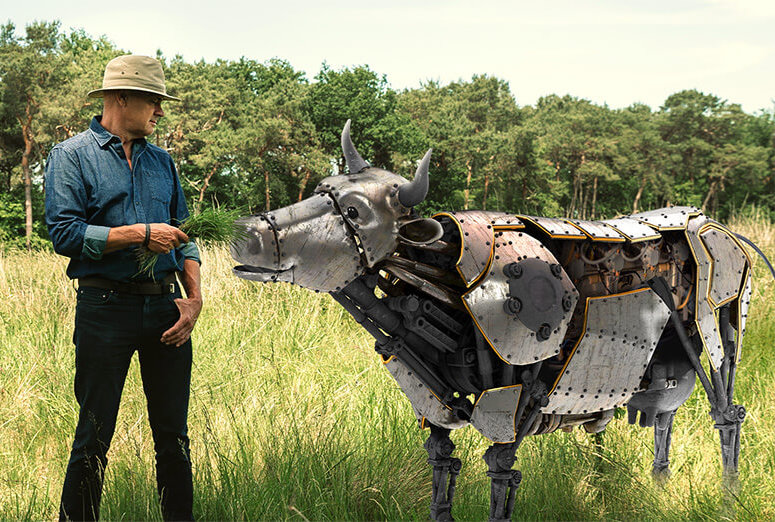EU to Invest €50M in Startups to Scale Up Precision Fermentation in 2024, Industry Think Tank Hails Commitment to Bloc’s ‘Food Security’
6 Mins Read
The EU is investing €50M in precision fermentation and algae-based food startups next year as part of its Horizon Europe scheme, with calls for applications beginning in May.
It’s the legislative body’s first funding commitment directed specifically at precision fermentation, which it recognises as a way to improve the health and sustainability aspects of its food supply.
The EU has announced a €50M funding package for startups and small businesses working with precision fermentation, as part of the European Innovation Council’s Work Programme 2024 (which falls under the bloc’s flagship Horizon Europe scheme).
The investment focuses on helping these companies scale up to surpass the bottleneck challenges and lack of infrastructure in Europe. The call for applications will open in May, to support the EU’s climate schemes and improve the efficiency, resiliency and sustainability of the region’s supply chain.

Why the EU chose to focus on precision fermentation
This is the first time the EU has committed capital directly to precision fermentation (it has previously announced funds for broader alt-protein projects, including traditional fermentation). Its Accelerator Challenge supports the production of food from precision fermentation and algae that decouples it from the soil and environmental conditions.
This includes the development of viable alternative proteins that complement agriculture and are rich in proteins, fats, carbohydrates, dietary fibres, vitamins, minerals, and other nutrients, produced by bacteria, yeasts, fungi, and algae in quantities equal to or greater than other plant-based or conventional animal foods. These products also “deliver precision nutrition”, offering consumers healthier alternatives and maintaining nutrition security across the region.
Then there’s the environmental value. The EU notes how precision-fermented foods can be produced from agricultural sidestreams instead of high-value crops and can be used for human consumption, nutrition supplementation and even animal feed. “The benefits of such a shift include ease of production, independence from climate conditions, reduced pressure on natural resources such as land and water, reduced hazards associated with the use of pesticides and antibiotics, and cost-effectiveness,” it states, adding that a transition from current livestock systems would reduce dependency as well.
The EU itself has been embroiled in controversy over the delay of a caged farming ban for animals like pigs and hens, which was set to go through by the end of this year. But it has been indefinitely delayed after a pushback from the animal agriculture lobby, despite citizen support for the legislation.
And while the bloc notes how this funding commitment will support policy actions like the EU Soil Mission, Fit for 55, REPowerEU, the Green Deal, and Farm to Fork strategy, the latter two have been under jeopardy too, thanks to the deep ties between certain EU members and the agriculture lobby. Nevertheless, the EU insists that the key goal of this Accelerator Challenge is to “support the production of sustainable and nutritious food from precision fermentation and algae”.
Speaking to Green Queen, Acacia Smith, senior policy manager at GFI Europe, said: “While this latest announcement provides further evidence of a growing recognition of the importance of these foods, the cultivated meat ban recently passed in Italy demonstrates that Europe is sending mixed messages to researchers and companies.
“The EU now needs to develop a coherent strategy to support the sector, providing strategic investments in R&D and using instruments such as Horizon Europe to help commercialise precision fermentation, in order to avoid the continent falling behind the rest of the world.”

Funding criteria and alt-protein support
In terms of the criteria, the funding will cover startups using bacteria-, yeast- or fungi-based fermentation tech, or macro- and microalgae-based novel aquaculture systems. Companies must go “beyond incremental changes to the state of the art”, delivering novel production methods that can yield energy-efficient, resource-light and low-emission foods.
The tech should also be scalable based on process parameters including light, temperature and pressure, to allow custom modification of the final product for a range of environments, such as those with high or extreme resource constraints, without compromising the benefits of a shift to precision fermentation.
Additionally, startups must ensure a closed-circle production process to prevent the release of microbes or contaminants into waste streams, which means all projects hoping to obtain funding will need to provide a life-cycle assessment analysing the environmental, social and economic aspects. Furthermore, company proposals are expected to consider regulatory aspects and issues surrounding consumer acceptance and articulate suitable strategies to support market entry within and beyond the EU.
The eventual aim is to decouple food production from the soil and minimise climate impacts. The EU is hoping to back “radical technological innovation with possible disruptive effects on existing markets” to help secure additional food sources while simultaneously preserving biodiversity. This will help foster the region’s technological autonomy and leadership to deliver scalable food manufacturing processes that present benefits to consumers both within the EU and internationally.
But while this funding initiative is positive news, alt-protein has been hugely neglected in the EU historically, with meat and dairy farmers receiving 1,200 times more public funding, and cattle farmers earning half of their incomes through direct subsidies. “While European investment has increased in recent years, it’s clear the sector is still only picking the crumbs off the EU’s table,” said Smith. “Grants such as this one will make a difference in helping scale production and reduce prices, but we need to see this ambition continue to avoid Europe missing out on the enormous benefits of food such as precision fermentation.”

Regulatory and legislative support for precision fermentation
Precision fermentation – a subject of fermentation tech used for alternative proteins – has been gaining steam in the last year or so. According to the Good Food Institute (GFI), the fermentation sector attracted $842M in funding last year, behind plant-based and cultivated proteins. But in 2023, it has outpaced both of the others, with $273M in investment (more than double the financing in plant-based proteins, and nearly three times as much as the cell-cultured sector).
Within Europe, funding grew by 37% in 2022. The precision fermentation sector itself has undergone many milestones this year, with brands announcing funding rounds and breakthroughs to help scale up and accelerate their route to market. For example, Belgian myoglobin startup Paleo raised €12M in Series A funding before announcing a move into pet food, while Germany’s Formo unveiled its ‘lab-brewed’ egg alternative in foodservice locations.
“The EU Commission is working on a Biotechnology and Biomanufacturing Initiative aiming to look at how to scale up promising biotechnologies, and an EU protein strategy,” explains Smith. “We hope both documents – expected by March – will recognise the potential of precision fermentation in achieving the EU’s strategic autonomy and food security ambitions.”
Meanwhile, Better Dairy, Formo, Imagindairy, Onego Bio and Those Vegan Cowboys became the founding members of the Food Fermentation Europe coalition in March, with an eye to advance the EU’s novel foods regulatory approval process for precision fermentation.
“The EU Commission and EFSA have led on some very welcome engagement with the precision fermentation sector during recent months, with events including EFSA’s Scientific Colloquium in May demonstrating a commitment to work together to understand the role of alternative proteins in a future food system,” noted Seth Roberts, policy manager at the GFI Europe.
“While robust regulation is essential to secure consumer confidence in new foods, regulators can help to prevent unnecessary delays by ensuring the process is transparent – such as by engaging in dialogue with companies – and these moves have been a very positive step,” he added.
“It’s excellent that the European Innovation Council has recognised precision fermentation’s game-changing potential to feed Europe’s growing population, improve public health and reduce our reliance on imports,” said Smith. “It’s also very welcome that this funding aims to develop new ways of scaling up production – tackling Europe’s lack of infrastructure – and to look at other critical areas such as consumer acceptance, regulatory approval and supporting the entry of these foods into the European market.”



